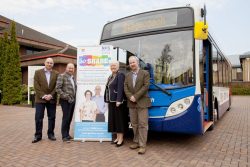Stagecoach backs spare blood project to help fight disease
Published On Tue 29 Apr 2014 by Roddy Isles

Stagecoach Chairman and co-founder Sir Brian Souter is backing world-leading medical research in Scotland, as hundreds of posters promoting the GoSHARE spare blood project are displayed on Stagecoach buses across Tayside, Fife and Grampian.
The posters encourage people who give blood samples – either to their GP or while in hospital - to allow the leftover samples to be used for medical research.
Every day in Scotland, many thousands of samples of blood are discarded after use. Now researchers are asking the public to let them use that blood to boost research into diseases such as cancer, diabetes and asthma.
The GoSHARE project launched by the University of Dundee, in partnership with NHS Tayside Blood Sciences, is pioneering an easy way for people to help the fight against disease. It only takes one minute to sign up to GoSHARE but the benefits may be felt for generations to come, say researchers.
From this week information on how to sign up to GoSHARE will be displayed on Stagecoach buses across Tayside, Fife and Grampian, with Stagecoach Group Chairman Sir Brian Souter giving the campaign his backing.
Sir Brian said: “This is a simple way that people in Tayside can make a hugely important contribution to medical research and we are delighted to be supporting this project. By agreeing that spare blood samples can be used for medical studies, the public could potentially help find cures and new treatments for serious illnesses that affect millions of people across the country every day.”
Perth and Kinross Provost Liz Grant is also supporting the project. She said, “Having a nursing background, I fully appreciate the important work of this project and would encourage the people of Perth and Kinross to support GoSHARE.”
The GoSHARE project is led by Professor Colin Palmer, of the University of Dundee.
“Over the past 15 years around 10 per cent of the Tayside population (40,000 people) have signed up to genetic studies and this has resulted directly in major discoveries of genetic variants for eczema, asthma, diabetes and heart disease amongst others,” said Professor Palmer.
“With the information we can gather from blood samples there is even more we can do to help fight these diseases and it only takes a minute for people to sign up and help us.
“We are hugely grateful to Sir Brian and Stagecoach for helping us get the message to as many people as possible. Sir Brian has been a great supporter of the research we are doing at the University of Dundee and we welcome this latest show of support.”
The use of `spare’ blood is resourceful and unique, and a world first. This is made possible only by the close collaboration between the University of Dundee and NHS Tayside, as well as the installation of new technologies which allow the quick and effective tracking of blood samples.
GoSHARE is an additional component to the wider Scottish Health Research Register (SHARE), permission is being sought to store and carry out research on left-over blood following routine testing in the laboratory.
Research is an essential part of the process of developing new treatments and cures for conditions including heart disease, diabetes and cancer. The aim of SHARE is to make it easier for researchers in Scotland to carry out medical studies. Scots on the register will be invited to participate in research projects, but they only say yes if they have the time and wish to. There is no obligation to take part.
Once people have signed up to GoSHARE they do not need to do anything else - there is no need for a special sample of blood to be taken and they do not need to make a visit to their doctor. The samples are anonymised using a barcode.
People can sign up at www.goshare.org.uk or complete FREEPOST brochures that are widely distributed throughout Scotland including Clinics, GP surgeries and pharmacies.
Sir Brian Souter has been supporting medical research at Dundee in a personal capacity for many years through the Souter Charitable Trust. This includes the TASCFORCE Study, which aimed to find out whether screening techniques could be more effectively used to identify people at risk of heart disease so that it can be prevented or treated at an early stage. The study checked out nearly 5,000 people in the region.
So far, the early results indicate that just over 12 per cent of the healthy volunteers had previously undetected or untreated health problems including high blood pressure, high cholesterol and high blood sugar. All of these participants received appropriate advice and have been referred to their GPs for further investigations and treatment. This will save many lives.
SHARE is a partnership between the NHS in Scotland, the Scottish Government and Universities in Scotland.
For more information contact:
Roddy Isles
Head of Press
University of Dundee
Nethergate, Dundee, DD1 4HN.
TEL: 01382 384910
MOBILE: 07800 581902
E-MAIL: r.isles@dundee.ac.uk